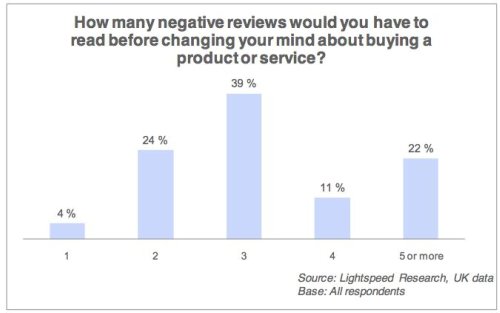Some background from the Digital Marketing blog Econsultancy.com:
Between one and three bad online reviews would be enough to deter the majority (67%) of shoppers from purchasing a product or service, according to a Lightspeed Research study.
Here is the chart from the research report that reflects this conclusion:

In the consumer and retail world these days pretty much no matter what the purchase situation - big ticket items like cars or consumer electronics, or even less costly and more ethereal kinds of buying decisions like, 'Where should we have dinner in St. Louis?'; it seems like the majority of folks spend some time online,either on commercial websites, crowdsourced review or rating communities, or on social networks before making the decision on where to spend their time and money.
And we see from the results of surveys like the one referenced in the Econsultancy piece, from anecdotal evidence and observations, and from just examining our own behaviors we know this to be true. When was the last time you tried a new restaurant without checking out the website, or seeing if there were any reviews on Yelp?
In the consumer space the potential detrimental effects of a negative review on sales, market share, and reputation are increasingly seen by marketers and brand managers as very real and relevant. Sure, there remains and will continue to be differing opinions as the correct strategy that consumer brands should adopt in response to these negative reviews, but there no longer is much serious discussion that they do have an impact at some level on the brand. The Lightspeed survey that is the subject of the Econsultancy piece takes this realization a step further by quantifying the impact of these negative reviews on purchase decisions. Which is pretty neat.
Let's spin this forward to the workplace, and specifically to the recruiting/employer branding space. It has become pretty much accepted that similar to the consumer market, that organizations not only need to carefully monitor their employer brand, and be mindful and aware of negative mentions and reviews of things like the application experience, the work environment, and the organization's reputation as a good or bad place to work on sites like Glassdoor and on social networks, that they may also need to take positive steps to ensure their messages about the unique employer value proposition are being clearly communicated.
What seems to be missing though, in the organizational employer branding space, is a better understanding of the specific impact that both negative and positive reviews or mentions have on the potential candidates attitudes towards the organization, and ultimately their willingness to apply for positions.
At the recent HR Executive Forum in New York City, several senior Human Resources leaders from some of the largest companies in the country talked about their companies and their CEO's reviews on Glassdoor.com. Quite frankly I was surprised how much this rating and information site had caught the attention of these HR executives. But while they were all aware of the content that had been posted on the site about their organizations, none seemed to offer any real understanding of just what, if any, real impact the information on Glassdoor had on things like applicant numbers, quality of applicants, and lasting impact to their ability to attract the talent they are seeking.
It is obvious that bad reviews of the organization as a place to work are, well, bad. But just how bad? When and how should HR and recruiting organizations respond?
How many bad reviews on Glassdoor or digs on Twitter add up to a meaningful and harmful impact?
Is there any way to know? I'd be curious to hear if anyone is aware of any data on the recruiting side similar to the consumer data referenced in the Econsultancy piece.